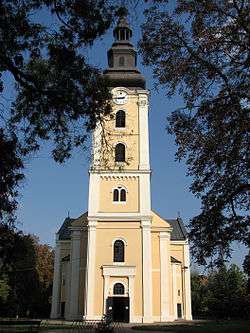Eastern Orthodoxy in Hungary
Orthodox Christianity was historically an important religion in Hungary. Now Eastern Orthodoxy in Hungary is the religion mainly of some national and ethnic minorities in the country. In the 2001 national census only 15,928 persons declared themselves Orthodox Christians (0.21% of the people with declared religious affiliation and 0.15% of the whole population).
Between the middle of the 10th and the beginning of the 13th century, medieval Hungary had occasional political ties with the Byzantine Empire and Kievan Rus'. During that period, there was significant presence of Eastern Orthodoxy in some southern and eastern parts of medieval Kingdom of Hungary, mainly by Romanian and Ukrainian minorities.[1]
In 1440, Hungarian king Ladislaus the Posthumous granted special privileges to Eastern Orthodox Christians for the establishment of the Serbian Kovin Monastery. In 1481 and 1495, during the times of Turkish invasions, Hungarian kings Matthias Corvinus and Vladislaus II have granted special privileges to Eastern Orthodox Christians in order to secure demographic recovery and improve the defenses of southern frontiers.
Historically, from the late Middle Ages up to the beginning of the 20th century, the territory of Hungary has been the exclusive jurisdiction of Serbian Orthodox Church through the Eparchy of Buda, created in the 16th century and centrally located in the town of Sentandreja at Virgin's Cathedral (Belgrade Cathedral).
Now there are other jurisdictions of the Eastern Orthodox Church also active in Hungary.
The Russian Orthodox Church has the Budapest and Hungarian Eparchy headed by Archbishop Mark, whose see is in Budapest. The Budapest and Hungarian Eparchy of the Russian Orthodox Church has eleven parishes, with eight priests and one deacon.[2]
The Ecumenical Patriarchate of Constantinople also maintains a presence in Hungary. The Hungarian Exarchate is part of the Metropolis of Vienna of the Ecumenical Patriarchate of Constantinople. They have seven parishes in the country.[3]
The Romanian Orthodox Church has the Orthodox Eparchy of Hungary headed by Bishop Silian Mănuilă, whose see is in Gyula.[4]
The Bulgarian Orthodox Church has two parishes in Hungary, in Budapest and Pécs, with one priest. Both parishes are under the authority of the Bulgarian Orthodox Eparchy for Central and Western Europe.[5]
References
- ↑ Éva Révész, Régészeti és történeti adatok a kora árpád-kori bizánci-bolgár-magyar egyházi kapcsolatokhoz, Doktori értekezés, Szeged 2011.
- ↑ "Будапештская и Венгерская епархия / Организации / Патриархия.ru". Patriarchia.ru. Retrieved 2012-02-23.
- ↑ Takáts Botond. "patriarchatus.hu". Patriarchatus.hu. Retrieved 2012-02-23.
- ↑ "Organizarea Administrativă | Biserica Ortodoxă Română". Patriarhia.ro. Retrieved 2012-02-23.
- ↑ "Българска източноправославна епархия в Западна и Средна Европа". Bg-patriarshia.bg. Retrieved 2012-02-23.
Literature
- Éva Révész, Régészeti és történeti adatok a kora árpád-kori bizánci-bolgár-magyar egyházi kapcsolatokhoz, Doktori értekezés, Szeged 2011.
- Kiminas, Demetrius (2009). The Ecumenical Patriarchate: A History of Its Metropolitanates with Annotated Hierarch Catalogs. Wildside Press LLC.
External links
- Budapest and Hungarian Eparchy of the Russian Orthodox Church
- Romanian Orthodox Eparchy of Hungary
- Hungarian Exarchate

